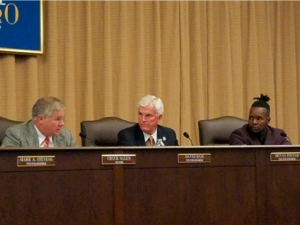Mayor's vote questioned
By Rochelle Moore
Published in News on December 5, 2017 5:50 AM

News-Argus/ROCHELLE MOORE
Mayor Chuck Allen, left, discusses Councilman Bevan Foster's proposal to reduce the mayor's voting power during the Goldsboro City Council meeting, as Mayor Pro Tem David Ham, center, listens.
Councilman Bevan Foster made a move to reduce the mayor's voting power during the Goldsboro City Council meeting Monday.
At the end of the meeting, when each of the council members are provided with time for a few words, Foster made a motion that Mayor Chuck Allen only be allowed to vote when the seven-member council is locked in a tie vote.
Historically, the Goldsboro mayor has been able to vote on all council decisions, Allen said.
"Most cities are set up that way -- the mayor doesn't vote," Foster said. "He only votes when it's a tie-breaker.
"I feel like, right now, his influence is too over the board."
In November, Foster, who decided to step down from his mayor pro tem post a month early, cited disagreeing views from the mayor.
Councilman Antonio Williams seconded Foster's motion, which was delayed for two weeks, after the council learned that the city attorney would need to review state law and the city's charter prior to a vote.
The city charter allows the council to make certain ordinance changes. Some charter changes require legislative approval, said Jim Womble, city attorney with the Everett, Womble and Lawrence law firm.
"The council can change some things in the charter but other things would have to be changed by a local act of the legislature," Womble said.
Even though the city's ordinance states that the mayor has the authority to vote on all city matters, Foster said the rule is outdated.
"Those ordinances are old," Foster said. "They're not current to most policies in most cities. I think it's time for a change."
Instead of voting on the change, the council decided to wait two weeks to allow enough time for the attorney to review city ordinances and state law.
In its decision to wait until Dec. 18, the council was divided again in a 4-3 split vote. Voting in favor of the two-week delay were Foster, Williams, Mayor Pro Tem David Ham and Councilman Gene Aycock.
Allen, Councilman Bill Broadaway and Councilman Mark Stevens voted against the delay.
"If I don't have to vote, it's easier for me," Allen said, after the meeting. "But I think as mayor, the public ought to know where I stand on issues. So from that standpoint, I think, I should vote.
"Certainly, I'll do whatever the majority of the council wants me to do."
The council was also divided on a decision that's tied to a proposed $11 million investment project in downtown Goldsboro. The council voted 5-2 in favor of donating four city-owned properties, at 200, 204 and 206 E. Walnut St. and 106 S. John St., to the Downtown Goldsboro Development Corp., a nonprofit organization focused on downtown revitalization.
Foster and Williams voted against the property transfer. After the meeting, Foster said he didn't have enough information about the property donation. Williams said he had no comment.
The council decision includes a city agreement to continue paying the cost of insurance on the buildings for six months. City staff will also reassess the buildings in six months to determine if the roof at 200 E. Walnut St. needs to be replaced, if an investor has not acquired the properties.
The four properties are part of a six-property proposal by Rehab Development to convert 68,000 square feet of downtown building space into 55 market-rate apartments and nearly 12,000 square feet of commercial space.
The project hinges, in part, on the company's ability to tap into federal historic preservation tax credits, which have been under question during federal budget negotiations.
Julie Metz, Goldsboro's downtown development director, told the council that the DGDC plans to create a limited liability company for the properties, which can be transferred to a developer and grandfathered into the current tax code, making the project eligible for the historic tax credits.
